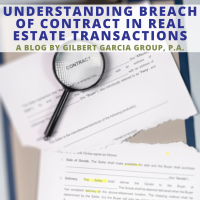Understanding Breach of Contract in Florida Real Estate Transactions

Our last blog post discussed the Florida real estate contract dispute process. There, we mentioned the determination of a breach of contract in a purchase agreement real estate contract, and how the experienced real estate attorneys at Gilbert Garcia Group can guide you on your legal journey should a breach of contract be suspected.
Just like with a real estate contract, we believe that understanding the concept of breach of contract and its implications is a crucial first step for anyone involved in a real estate deal. In this blog post, we delve into the topic of breach of contract in Florida real estate transactions.
What Constitutes a Breach of Contract in Florida?
In Florida, a breach of contract occurs when one party fails to fulfill their contractual obligations without a valid legal excuse. If a party does not follow the terms of the contract, the non-breaching party may be able to take legal action and file a lawsuit in court. Breaches of contract may be partial or complete breaches (minor breach/material breach, respectively) and can occur in various scenarios such as non-payment, failure to deliver the property as agreed, failure to disclose defects, and/or violation of any other contractual provision.
Material Breach vs. Minor Breach
A material breach occurs when a party’s failure to perform a contract’s essential terms substantially affects the other party’s rights and expectations. Any action—or failure to act—that significantly impacts the non-breaching party is a material breach. A significant impact is any result that leads the non-breaching party to not get the result they bargained for. Material breaches are considered more serious than minor breaches and make completing the contract difficult or even impossible. For example, imagine you are the buyer in a real estate transaction and the seller fails to repair a leaking roof as required by the contract. Since a functional and watertight roof is essential to the property’s habitability, the seller’s failure would likely be considered a material breach, which is actionable under Florida law.
A minor breach, on the other hand, refers to a minor or less significant contract violation that does not substantially impair the agreement. An example of a minor breach in a real estate contract would be the seller forgetting to include a specific lighting fixture or household appliance in the description of items included in the sale. Despite a minor breach of contract, the contract is mostly still intact and while less significant, it’s important to note that if a non-material breach occurs, the non-breaching party may be entitled to compensation. However, the non-breaching party will only be eligible for compensation if they can prove the ways in which they were damaged by the breach.
Remedies
The difference in remedies available to non-breaching parties after a material and minor breach are significant. When a material breach of contract occurs, the non-breaching party could elect not to perform their responsibilities under the contract. In addition, the non-breaching party will have the option to sue the breaching party for monetary damages and, in some cases, seek specific performance. Common remedies include:
Specific Performance: This remedy compels the breaching party to fulfill their contractual obligations as agreed upon. In real estate transactions, it could involve the court ordering the seller to convey the property or the buyer to make payment.
Damages: Monetary compensation may be awarded to the non-breaching party to cover any losses incurred due to the breach. Damages can be either actual damages, which aim to restore the injured party to the position they would have been in had the breach not occurred, or consequential damages for foreseeable losses resulting from the breach.
Rescission: Rescission allows the parties to terminate the contract and return to their pre-contractual positions. This remedy is typically sought when the breach is so severe that continuing with the contract is no longer viable.
A breach of a real estate contract can lead to significant losses for the parties involved, and by recognizing what constitutes a breach, distinguishing between material and minor breaches, and knowing the remedies and resources available, you can navigate the legal landscape with confidence. When facing or considering suit for breach of a real estate contract, consulting a knowledgeable, experienced real estate attorney is crucial to protecting your interests. Let the Tampa real estate experts at Gilbert Garcia Group assess your specific situation and provide tailored, outstanding legal advice and service. Contact Gilbert Garcia Group today.

